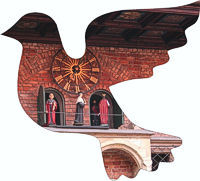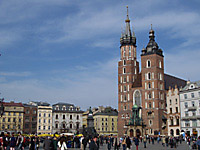|

Tips for the Business Visitor Coming to Krakow
Visas:
Visitors from the member-states of the European Union and/or
NATO as well as other Western European nations do not need
visas to enter Poland. Otherwise, when a country wants
Polish citizens to acquire a visa the general rule is that
Poland requires citizens of that country to secure one for
admission to Poland as well.
Apart from the citizens
of the EU countries - and Switzerland, Iceland,
Liechtenstein, and Norway - all aliens need a visa to reside
in Poland beyond 90 days. Nationals of EU member states as
well as Switzerland, Iceland, Liechtenstein, and Norway need
to register their stay in Krakow when it lasts longer than
three months.
Anyway, when planning to
visit Poland businesspersons from outside the European Union
should rather check with the nearest Polish consulate for
the current entry requirements.
Note:
Krakow’s
Office for Civic Affairs and Foreigners, Wydzial Spraw
Obywatelskich i Cudzoziemcow Malopolskiego Urzedu
Wojewodzkiego, is situated at 6 Przy Rondzie street (ground
floor). It handles formalities pertaining to visa extension,
permanent and temporal residency, work permits, etc. Opening
hours are
9 a.m. to 5 p.m. on
Mondays and between 8 a.m. and 3 p.m. on Tuesdays,
Wednesdays, Thursdays, and Fridays
Employment:
Foreign businesspersons, as any aliens from outside the European
Union, need work permits to be employed legally in Poland.
Travel:
There are regular
direct flights
to the
Krakow
International Airport
from major
European hubs such as Amsterdam, Berlin,
Brussels, Frankfurt, London, Paris, Rome, Vienna, and Zurich,
as well as Barcelona, Budapest, Bristol, Cologne,
Copenhagen, Dublin, Dusseldorf, Edinburgh, Leeds, Liverpool,
Madrid, Milan, Moscow, Munich, Oslo, Stockholm, and some
other destinations. Transit connections via Warsaw link Krakow
with New York, Los Angeles and Miami in the USA, and with
Bangkok, Brussels, Cairo, Damascus, Dubai, Helsinki,
Istanbul, Kiev, Larnaca, Lyon, Minsk, Beijing, Riga,
St. Petersburg, and Vilnius among other
destinations. Express trains from several European capitals,
such as Austria's Vienna, Czech Prague, Germany's Berlin
(and Hamburg), Hungary's Budapest, Rumania's Bucharest, and
Ukraine's Kiev, run to or through Krakow. Also, there is
express train shuttle service between this city and Poland’s
capital Warsaw in addition to express railroad links with
all big cities in the country. And no place in Poland is so
easily accessible from the entire Europe by car as Krakow.
When in the city, the most convenient
means of transport
are taxis – cheap, plentiful, and largely dependable.
Note: Natives often use a dated English spelling for the
name of the city,
Cracow. The original Polish spelling is Kraków.

Leonardo da Vinci's Lady with an Ermine
in Krakow's Czartoryskich Museum is a must-see
Communication:
Public phones are still available throughout Krakow in street
booths, post offices, and other public venues – they can be fed
with special cards with a chip, available at the nearest
newsstand. If you bring a cell phone from abroad, it will
probably work in Krakow as in any other city in the European
Union.
In the open air wireless Internet is available
on the Rynek Glowny central square plus the adjoining
streets to the south and in the
Kazimierz historic district
near the
Old Synagogue.
Also, WiFi hotspots are accessible in many
cafes
in Krakow as well as
shopping centers
and other public spaces. There
a few Internet cafes in the city center though they are
usually hard to spot.
Tip:
Never bet overly on the language skills of the Krakow natives,
on average they speak English only somewhat better than
Frenchmen.

Rynek Glowny, Krakow's
huge central square at the heart of the
Old Town historic district remains the city's social
hub.
Currency:
The zloty (zl), divided into 100 grosze (gr), is the he Polish
currency. Denominations in circulation: notes zl10, zl20, zl50,
zl100, zl200, and coins: zl1, zl2, zl5, gr1, gr2, gr5, gr10,
gr20, gr50. Gold and silver collector coins of higher
denominations are also a legal tender but their actual worth far
exceeds the face value. The zloty is convertible, see the
current exchange rate at our
Krakow News
section.
Paying:
Cash payments are still most popular in Poland. At the same
time, major credit cards are accepted practically everywhere
except the smallest establishments. But nobody pays by
check. ATMs are plentiful in downtown Krakow.
/more
on money matters in Krakow/
Electricity:
230 volts, 50 Hz AC, continental (two-prong or three-prong with
built-in grounding plug) outlets.
Weights and measures: Metric.
Time:
CET as Berlin or Vienna, i.e. GMT/UTC plus one hour.
Business hours: Polish office workers usually start at
8 a.m., have an eight-hour day without a normal lunch break, and
leave at 4 p.m. Business pauses on weekends. Banking hours are
different in different banks, yet most branches open at 9 a.m.
or 10 a.m. and close at 6 p.m. or 7 p.m. on workdays. Most of
Krakow’s downtown shops remain open till 7 p.m. and beyond on
weekdays, while some grocery stores trade round the clock. Most
stores sells also on Sundays, usually till 3 p.m. Most
shopping centers in Krakow
stay open between 10 a.m. and 10 p.m. Monday to Friday and till
8 p.m. on weekends.
Holidays:
New Year’s Day, January 6th (Epiphany),
Easter Sunday and
Monday, May 1 (Labor Day), May 3 (Constitution Day, Corpus
Christi Feast, August 15 (Assumption), November 1 (All Saints
Day), November 11 (Independence Day), December 25 and December
26 (Krakow
Christmastide).
Dates and numbers: Day, month, year is the regular
order in dates, so July 4, 2016 is 04.07.2016 in brief. Thousands
are usually denoted by blanks and sometimes periods (1
000=1.000=one thousand) whereas fractions are separated with
commas (1,5 equals one and half).
Local customs: Foreigners are welcome by Krakow
residents. Any place save home and any time save merrymaking is
good for talking business here.
When eating out, business is a legitimate topic before, during
and after meal. It is usual to say ‘smatchnago’ (bon
appétit) before eating, and ‘na zdrovye’ (cheers) before
drinking.
On visiting people’s homes standard courtesies are observed.
With hugging and cheek kissing reserved for relatives of any
gender and for close friends of the opposite sex, universal
handshakes customarily begin and end every encounter. (Note:
during negotiations in Poland a handshake means rather “talk
is over” than “it is a deal”.) It is important to
take business cards to meetings and give one to each person
present.
Politeness in Poland requires men to open doors for women and
generally let them lead, the same applies to your seniors and
guests of any sex.
Flowers are very popular with Poles who give them on many
occasions, notably birthday and name-day celebrations, weddings
and visits to Polish homes.
Casual wear befits most social occasions, but you'd better dress
up for evening entertainment, dining out, or theater.
Click here for more tips
Polish phrase book for visitors to Krakow
|

Krakow Money
Business in Krakow
Krakow Economy
Best of Krakow
Foreign Direct
Investment in Krakow
Investing in
Krakow
Krakow Technology
Park
Taxes in Poland
Krakow's Real
Estate
New Town in the
Center of Krakow
Krakow's Biggest
Industrial Corporations
Basic Krakow info
for visitors
Travel to Krakow
Krakow Hotels
Dining Guide to Krakow Restaurants
Shopping in Krakow
Conference Facilities in Krakow
Lawyers in Krakow
Krakow News
Krakow Culture Events
Krakow Traditional Festivals
|





